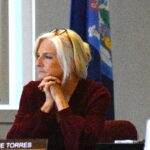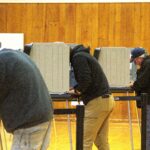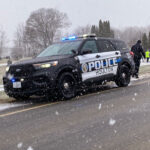
The number of students who are homeless has more than doubled at Caribou High School this year, and mental health problems are on the rise, school counselors said.
While additional staff and initiatives are helping, guidance counselors and social workers reported upticks in student failures, truancy and homelessness during a recent RSU 39 school board meeting.
The homeless numbers reflect a statewide trend, according to enrollment data from the Maine Department of Education. The state averaged 1,294 homeless students from 2014 through 2022, but the number rose to 2,186 in 2022-2023. Homelessness in general is a growing problem around the state with cities like Bangor and Portland dealing with homeless encampments.
“We have seen a tremendous amount of families that have been displaced,” said Denise Hamlin, homeschool coordinator and licensed clinical social worker at the high school. “Typically our numbers are like 15 [homeless students]. We’re probably at 30 to 40.”
Unstable home environments are a major factor. Students are affected by everything going on in their lives and when they come to school, it can be difficult to put all that aside and focus on schoolwork, Hamlin said.
Family discord is a big challenge, which includes families who may be struggling financially, who are in the process of a divorce or who have become homeless, she said.
Guidance counselors have worked with classroom teachers and students to help develop plans for them to succeed in school, she said. The effort is funded by the district’s recent McKinney-Vento grant.
The federal McKinney-Vento Homeless Assistance Act provides funds to help school districts ensure that students without stable homes can still attend school. Maine follows the act, which covers all K-12 students, according to the Department of Education.
RSU 39 has spent a large amount of the grant funding already to help make sure students without housing have the necessary supplies and transportation to attend school, Hamlin said.
“Families have really appreciated that and we’ve been successful in getting students here whether they’re within our community or if they’ve had to stay at the shelter in Presque Isle,” she said.
Other grant funding of about $750 per child allows the district to help families who could lose their homes because of financial problems, such as back taxes or inability to pay bills, she said. One of the challenges is that many families don’t know how to budget. School counselors are working with outside agencies to connect families with resources and education.
Caribou High School is also seeing an increasing number of students failing, said Guidance Counselor Rani Mehta. There are a number of reasons, including increased mental health needs and even school scheduling. The trimester schedule provides three times the chance for a potential failed course, she said.
Guidance staff are remedying the situation by working with students to track their academic progress, which includes weekly support team meetings, regular reports and planning, Mehta said.
A third staff member has allowed the counseling team to address bullying issues at Caribou Community School, said Freeman Corey, a social worker at the K-8 school.
Two parents alleged last month that their children had been bullied at the school, and wanted the school to reinstate a school resource officer position.
Social worker Tanya Stubbs joined Corey and colleague Pamela Giberson in 2022, and has drawn 51 students to join an anti-bullying group, Corey said. With the additional help, the team can be more proactive.
“Are there bullies at our school? Yeah. Is it as bad as it’s been painted? No, it’s not. And part of that falls to what we can now start doing, and that’s education,” he said.







